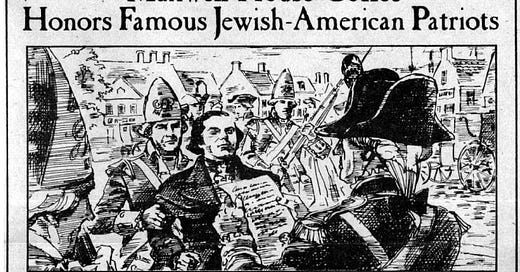I wrote last week about the 23 refugees from the Brazilian colony in Recife who landed in New Amsterdam. They did not receive a resounding welcome. The Governor of New Amsterdam, Peter Stuyvesant, for no reason other than hatred, wanted to expel them. He was overruled by his superiors in the Netherlands but he continued to make life difficult for them, refusing to issue them with trade permits and barring them from serving in the volunteer force guarding the colony.
Fortunately the Jews of New Amsterdam were not subject to Stuyvesant’s discrimination for long. Ten years after they arrived, in 1664, the British seized New Amsterdam from the Dutch. They renamed it New York and gave the resident Jews the same freedoms they enjoyed in America’s other British colonies. Ironically, Jews in British America enjoyed far greater freedoms than those in Britain itself.
Just over 100 years later, the Jews of New York found their gratitude and loyalties to Britain severely tested. The American colonies rebelled against British attempts to tax and control them, the Revolution broke out and, like everyone else in the fledging nation, Jews had to decide which side they were on. As far as historians have been able to tell, most Jews sided with the Revolution.
The British army was using troops who had come from the small German state of Hesse Kassel. The troops had been leased to them by Wilhelm II, the Landgrave, or ruler, of Hesse-Kassel. With his language skills, Haym Salomon, still imprisoned by the British, saw an opportunity,
There were little more than a couple of thousand Jews in the colonies when war broke out, around one tenth of one percent of the total population. Most of them were traders and merchants; they had settled in America for the economic opportunities the new continent offered. Their contribution to the war effort was threefold. Around 100 of them fought in the revolutionary army, some were active in procurement and others raised the finance necessary to pay the troops and fight the war.
The first of the Jewish fighters to die in the war, on August 1, 1776, was Francis Salvador of South Carolina. A member of the South Carolina legislature, he was serving with the colony’s militia when he was shot and scalped by Cherokee warriors fighting with the British.
Several Jewish fighters were captured. Solomon Bush, a Lieutenant Colonel in the Pennsylvania militia escaped captivity, fleeing with information about a British spy who had been stealing secrets from George Washington’s headquarters. Another captive, Isaac Franks, also managed to get away, making off in icy waters on the River Hudson in a leaky boat with only one paddle.
Mordecai Sheftall and his son were also arrested, while smuggling gunpowder to Boston. They were imprisoned on a British ship where they refused to eat the pork they were given. The British officers changed their diet, then ordered their guards to grease their knives and forks with pork fat.



